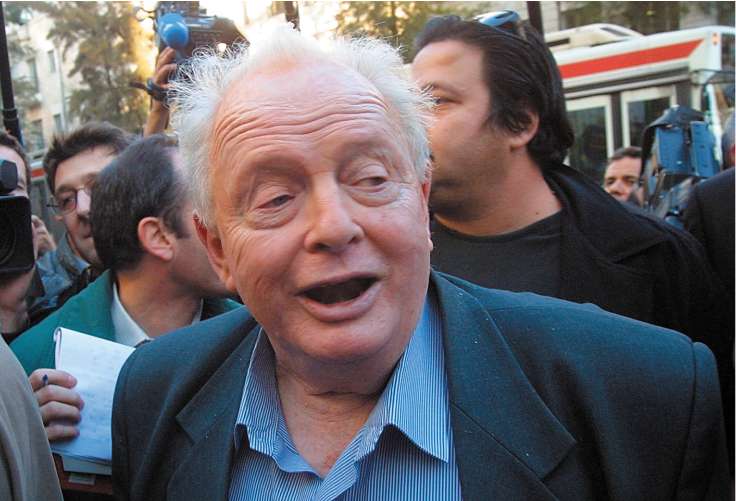Tommy Lapid: Champion of secularism in Israel

Tommy Lapid, the prominent and outspoken Israeli journalist, was the popular – and populist – champion of secularism in Israel in the first part of this decade. As a pugnacious opponent of what he saw as the disproportionate influence of ultra-orthodox Judaism on Israeli law and society, he led his centrist and socially liberal party Shinui ("Change") to its most successful election result ever in 2003. It became the third largest party, with 15 seats, securing the important cabinet post of Justice Minister, which Lapid held until he walked out of Ariel Sharon's government in December 2004 in protest at yet another state handout of funds to the ultra-orthodox sector.
"Everything I do in my life has its source in the Holocaust experience," Lapid told Eric Silver in an interview in 2003 when he was on the brink of his election success. "I am a product of that." Born Tomislav Lampel to Hungarian parents in Serbia in 1931, he saw his father, Bela, a lawyer and newspaper editor who was subsequently killed in the Mauthausen concentration camp, seized by the Gestapo. The family tombstone in the Jewish cemetery in Novi Sad contains the names of 11 of his close relatives who died in the Holocaust.
Tommy and his mother Katarina fled to Budapest under the protection of the Swedish diplomat Raoul Wallenberg. But their supposedly safe house was raided by Hungarian Fascists who rounded up Jews to kill them on the banks of the Danube. Mother and son managed to escape by hiding in a public lavatory. Tommy Lapid would say that it was then that "I understood there had to be a place where nobody wants to kill Jews".
He and his mother emigrated to Israel in 1948, where Tommy went straight into Israel Defence Forces, serving as a mechanic, before studying law at Tel Aviv University and beginning to write for the Hungarian language newspaper Uj Kelet. Introduced to the founding editor of Maariv, Azriel Carlebach, he became first his personal assistant – when he took his Hebrew name, Yosef Lapid – and then an increasingly prominent journalist on the paper.
After Robert Maxwell – with whom Lapid spoke Hungarian – bought Maariv, Tommy Lapid represented the tycoon in Hungary and Yugoslavia, buying newspapers for him after the collapse of Communism, saying later that he had "no reason whatsoever to suspect him of any wrong-doings". He was appointed by Menachem Begin in 1979 to head the Israel Broadcasting Authority. But it was his subsequent polemical performances on popular and raucous television talk shows, most notably Channel One's Popolitika, which he co-hosted, that made him a celebrity commentator.
His successful 2003 election campaign was fought on a platform of military service for all – including the ultra-orthodox young exempted for religious studies – civil marriage; public transport on the Sabbath; state recognition of Reform and Conservative Judaism; repeal of inflated allowances for bigger (mostly religious) families; and abolition of the Religious Affairs Ministry.
That those elections proved to be Shinui's peak, and that it did not achieve its goals – except, it now looks temporarily, the last of these – probably testified as much to the political power of the ultra-orthodox as to any political failures of Lapid's. Nevertheless the party first split and then effectively collapsed in 2006, winning no seats in the election of that year. Lapid subsequently returned to journalism and the airwaves, presenting his own radio show. He also became chairman of the board of the Yad Vashem Holocaust memorial and museum.
He was by no means a leftist in Israeli political terms. But on more than one occasion he drew on his own lifetime experience to denounce maltreatment of Palestinians in dramatic terms. In May 2004 he led cabinet dissent against the demolition of houses by the military in the southern Gaza town of Rafah. He subsequently denied that his remark that television pictures of an old Palestinian woman scrabbling in rubble for her medicine reminded him of his own grandmother was a reference to the Holocaust.
But when footage was shown on Israeli TV in 2006 of a woman Jewish settler hissing "whore" at her Palestinian neighbour and settler children throwing stones at Arab houses, Lapid explicitly compared such intimidation to that which he had faced as a child from anti-Semites in the years that pre-dated the Holocaust. His remarks were forceful enough for Yad Vashem to make clear that they reflected Lapid's personal view and not that of its board chairman.
Lapid had a notably happy family life. His books include two plays though he gave up as a dramatist in deference to the talent of his wife Shulamit, a successful novelist. And despite his abrasive wit, he had considerable charm. Surprised to encounter a British reporter after making a barnstorming speech to an election meeting in Herziliya in 2003, he reminisced fondly about the Fleet Street of the 1960s when he was the Maariv correspondent in London. He was a lover of music, food and drink, and argument.
Donald Macintyre
Tomislav Lampel (Yosef "Tommy" Lapid), journalist and politician: born Novi Sad, Yugoslavia 27 December 1931; director general, Israeli Broadcasting Authority 1979-84; chairman, Shinui Party 1999-2006; Minister of Justice 2003-04; married (one son, one daughter, and one daughter deceased); died Tel Aviv 1 June 2008.
Join our commenting forum
Join thought-provoking conversations, follow other Independent readers and see their replies
Comments